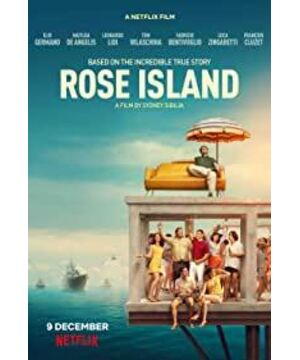This article has been published on "The Paper", please indicate the source for reprinting.
At the end of 2020, Netflix launched an Italian film "The Incredible History of Rose Island" based on real events. This film has launched an all-Italian cast lineup and launched two dubbed versions in Italian and English, which can be regarded as a sincere work under Netflix's internationalization strategy. Although the way the story is told, it still has a bit of Hollywood flavor.
The film is based on a modern utopian event full of freedom and fantasy-in the late 1960s, Italian engineer Giorgio Rosa built a steel-based building on the open sea 12 kilometers off the coast of Rimini. , 400 square meters of island, namely Rose Island. Based on the laws at the time, the high seas were not bound by any country, so Rosa declared Rose Island as the "Rose Island Republic", a country independent of Italy, and submitted independent sovereignty to international organizations including the United Nations, the Council of Europe and other international organizations. 's application.
Just like its straightforward name, the film uses 120 minutes to tell the whole process of the Republic of Rose Island from its origin, construction, development to the final blow up by the Italian government. However, this incredible real history, if not for the development of the movie by Netflix, would have been submerged in the vast sea almost like that small island.
"It's essentially a story about freedom," concludes producer Rovere, but when I watch the entire film, I think the message the creative team wants to convey is not so much freedom, it's more romantic, and it's still very Hollywood of romanticism. It is this tendency that makes director and screenwriter Sydney Sibilia deviate from the real Rosa and that history when writing the script.
To achieve romanticism, the script dramatizes at least two important elements: motivation and villain.
Rosa in the film is not only a man of science and technology, but also an infatuated kind. When he takes his ex-girlfriend for a ride in the car he assembled himself, it is not difficult to imagine that he will decide to build a steel island on the high seas in order to prove himself to the woman he loves. In this way, the film put Rosa's motivation for building the island in the word "love". Even later, what pushed Rosa to insist on applying for a legal independent state status for Rose Island was also the bad evaluation of Rose Island by her ex-girlfriend.
It is true that such a character will appeal to audiences, especially those who love romantic comedies, but it is far from the real Rosa who overcame all difficulties and practiced a maritime utopia more than 50 years ago.
According to the Wikipedia entry for Rosa, Rosa and his wife were married in 1960, while Rose Island was designed and built in 1967-68. Referring to the BBC's interview with the creator of the film and Rosa's son (Rosa himself died in 2017), Rosa's motivation for building the island was more of a passion for technical practice than love.
The producer himself also said that when he first contacted Rosa, Rosa had no interest in the story of building the island itself, but was very excited to introduce the offshore island construction technology he invented to the main creative team. This engineer, who is keen on innovation and practice, should be the most suitable person to "make the impossible into a possible technical madman", rather than a love brain who only wants to win a beautiful woman's smile.
It may be that he realized that the story could not be made into a romantic light comedy. In the second half of the film, he began to exert his strength on the idea of "freedom"-Rosa's move to establish a country on the Rose Island aroused the control of the Italian government. In the end, after the failure of "diplomatic" contacts, the two sides went to court and eventually moved towards the conquest of freedom by force.
I admit that the scene where the Jiandao 5 and Rosa's girlfriend face the Italian battleship hand in hand is lit, but a moment's high is not enough to make a free comment.
First of all, Rosa originally wanted to turn Rose Island into the Rose Republic, just because his ex-girlfriend complained that Rose Island was a "beach club where you can dance". , the main creative team followed the lazy logic of "if there is no conflict, then add a villain", and forced the Italian government to be a powerful villain with no brains and blacks. This blunt villain made Rosa and others lose their struggle to defend freedom. color.
In fact, the Italian government opposed the Republic of Rose Island back then, mainly because Rosa would set a bad precedent for tax evasion. The cardinals of the gang are all pulled in to disrupt the situation, making the logic of this powerful villain laughable.
Even from Rosa's point of view, the film one-sided Rosa's thinking.
According to Rosa's son, Rosa was an extremely methodical, precise and detail-oriented person. He deliberately checked the relevant laws before building the island, and chose Rose Island on the high seas with a coastline of 12 kilometers in order to gain legal recognition. In the later game with the Italian government, Rosa firmly believed that his island building was protected by law. In other words, what the Italian engineer defended might not be the romanticized spirit of freedom to challenge the power in the film, but his own rights under the law.
The obsession with romance, while ignoring the complexity of reality, is the main reason why the film is far less shocking than real events.
In fact, the era background of the incident should be included in the discussion.
Rose Island is ordinary in function, why was it frequently reported in the 1960s? Why attract people from all over the world? Why become a symbol of freedom? The hippie culture that emerged under the Vietnam War and the human rights movement was the soil of the era when Rose Island was very popular. It is a pity that these fundamental reasons that prompted the Italian government to focus on Rose Island were scribbled in the film.
Some people may argue that adding too much realistic background will make the film look serious and dull, then I will give an example to refute. The 2009 British film "Pirate Radio" has the same background in the 1960s and the same utopian story, but in the endless black humor, it maintains and sublimates the core of the spirit of freedom.
The creative team wasted such an amazing story, but in tribute to Rosana's breathtaking imagination and execution, I still recommend the film. If you can compare it with "Pirate Radio", I believe you can definitely get my point of view.
Personal public number: Guo Daxia's rivers and lakes
View more about Rose Island reviews










